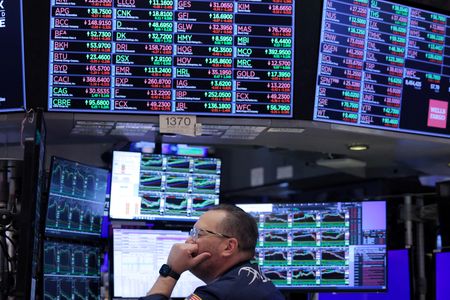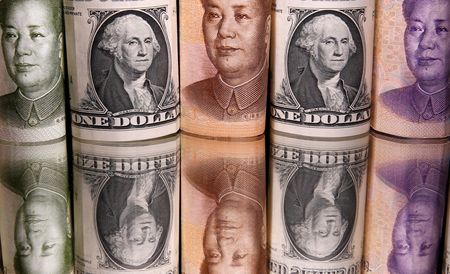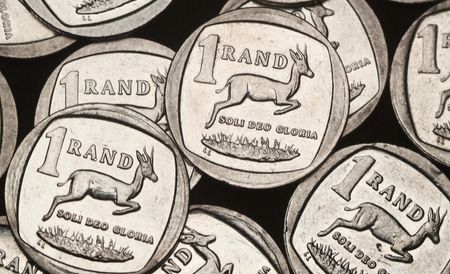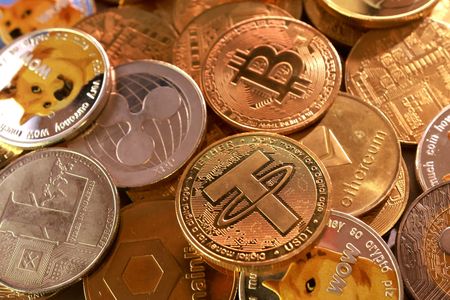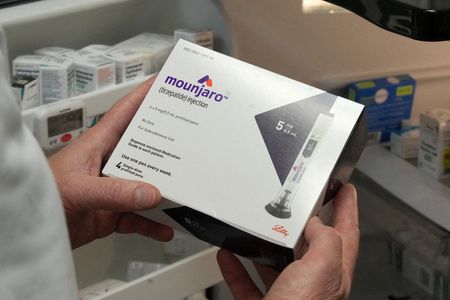By Sinéad Carew and Dhara Ranasinghe
NEW YORK/ LONDON (Reuters) -MSCI’s global equities gauge rose on Monday to regain some ground lost in Friday’s steep sell-off after U.S. President Donald Trump softened his tone on the U.S.-China trade war, but safe-haven gold hit fresh record highs in a sign that uncertainty remained high.
Investors were placated after U.S. Treasury Secretary Scott Bessent said on Monday that Trump is on track to meet Chinese leader Xi Jinping in late October as the two sides try to de-escalate trade tensions.
On Friday, Trump had threatened 100% tariffs on China from November 1 in response to China’s curbs on exports of rare earth elements. But by Sunday, the U.S. president sounded more conciliatory, posting on social media that the U.S. did not want to “hurt” China.
“Investors at the end of last week were worried that there was potential escalation in tensions between the United States and China. It looks like this morning they’ve walked that back a little bit,” said Chris Zaccarelli, chief investment officer, Northlight Asset Management, Charlotte, North Carolina.
Zaccarelli also said Monday’s news that OpenAI has partnered with Broadcom <AVGO.O> to produce its first in-house artificial intelligence processors, “adds to the general enthusiasm around artificial intelligence and related industries.”
MSCI’s gauge of stocks across the globe rose 8.93 points, or 0.92%, to 981.18, regaining some but not all lost ground after it fell more than 2% on Friday.
On Wall Street at 2:45 p.m., the Dow Jones Industrial Average rose 584.20 points, or 1.28%, to 46,063.66 after falling sharply on Friday.
The S&P 500 rose 101.10 points, or 1.54%, to 6,653.61 after losing 2.7% in the prior session and the Nasdaq Composite rose 474.62 points, or 2.14%, to 22,679.05 after falling more than 3% on Friday.
Tim Ghriskey, senior portfolio strategist at Ingalls & Snyder in New York, noted some signs of remaining skepticism in the market as investors were still buying gold.
“Gold is the fear trade. Even with Trump backing away from the 100% tariffs on China, there is fear out there and gold is traditionally the place to hide,” he said. Also, BofA commodities analysts said in a note on Monday that they had raised their forecast for gold to $5,000 an ounce for next year from $4,400.
Spot gold breached $4100 per ounce for the first time and was last up 2.1% to $4,101.82 an ounce. U.S. gold futures rose 3.07% to $4,098.00 an ounce.
Earlier the pan-European STOXX 600 index closed up 0.44% although France remained in the spotlight with reappointed Prime Minister Sebastien Lecornu facing pressure to get a budget deal approved.
In currencies, the dollar index, which measures the greenback against a basket of currencies including the yen and the euro, rose 0.19% to 99.24.
The euro was down 0.4% at $1.1571 while against the Japanese yen, the dollar strengthened 0.75% to 152.28.
Japanese markets have had their own problems with the ascension of new LDP leader Sanae Takaichi to prime minister now in doubt, contributing to a sharp rebound in the yen and a 5% dive in Nikkei futures on Friday. Japan’s Nikkei was closed on Monday for a holiday.
In cryptocurrencies, bitcoin gained 0.22% to $115,315.32.
For Monday’s Columbus Day/Indigenous Peoples’ Day holiday, U.S. bond markets are closed.
Oil prices rose on Monday after hitting five-month lows on Friday, as investors focused on easing of U.S.-China trade tensions and assurances that Trump will meet his counterpart later this month. [O/R]
U.S. crude settled up 1% or 59 cents at $59.49 a barrel and Brent finished at $63.32 per barrel, up 0.94% or 59 cents on the day.
In the week ahead, investors will be monitoring the earnings season kick-off with major U.S. banks reporting, including JPMorgan, Goldman Sachs, Wells Fargo and Citigroup.
S&P 500 companies overall are expected to have increased earnings by 8.8% in the third quarter from a year earlier, according to LSEG IBES, and strong results will be needed to justify the market’s high valuations.
(Reporting by Sinéad Carew in New York, Dhara Ranasinghe in London and Wayne Cole in Sydney; Editing by Ros Russell, Toby Chopra and Aurora Ellis)

